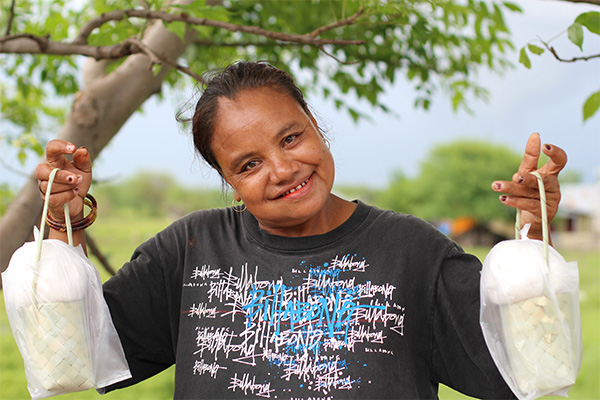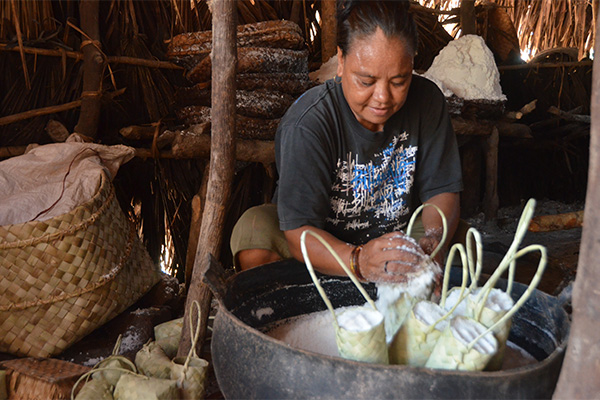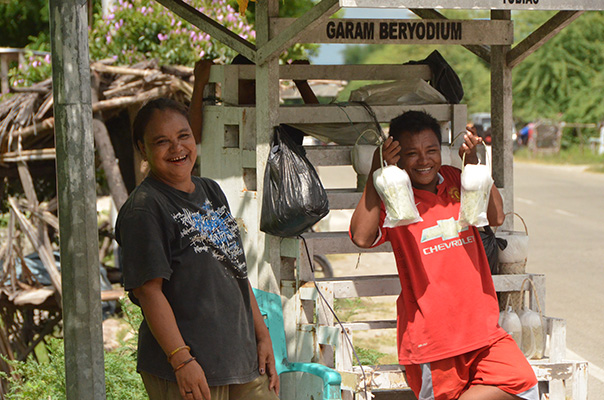Breaking the cycle of poverty

Marta holds cooking salt ready for sale in Oebelo, Indonesia. Photo © Sara Bolst
Growing up in Oebelo, Indonesia, Marta’s family depended on income from selling salt to meet their daily needs. At 15, Marta dropped out of school to help her parents with their business.
“My parents were poor so they could not send us to school. All I wanted was to graduate from high school,” Marta said. “I felt regret but what can we do, our parents were poor so we should help them. I didn’t have any dreams.”
Today, with a family of her own, Marta has continued the family business making and selling salt. However, life has been tough for her four children – only one of whom was able to graduate from high school.
Two of Marta’s adult children live with a disability and require daily care. Her son Viki has a brain disorder and her daughter has vocal cord disruptions, impeding her ability to speak. With limited access to healthcare and support, neither children were able to finish primary school.
“Viki started to have convulsions when he was nine; he is 22 years old now. He was having convulsions day and night for three months,” Marta said. “We have been to many hospitals to examine him. He didn’t even finish his first grade of elementary because of his illness.”
“I was worried and hopeless, I wanted to give up because it was so difficult to earn.”
During this time, Marta struggled to afford her children’s healthcare fees. With no health insurance, the family used what income they made from their business to afford the expenses.
“We sell it [salt] in the market, in our home, everywhere so we can pay for the hospital,” Marta said. “I was worried and hopeless, I wanted to give up because it was so difficult to earn.”
In Indonesia, 9.4 per cent – or close to 25 million people – live below the national poverty line, with a further 20 per cent vulnerable to falling into poverty.

Marta prepares cooking salt ready for sale. Photo © Sara Bolst
Families living in rural and remote areas are often the poorest and are less likely to have access to the tools they need to leave poverty behind, such as healthcare, education and essential services.
A small loan can be the first step to moving out of poverty. However, most families will need to go through multiple loan cycles as they build their businesses. Simon Lynch, Opportunity’s Community Development and Indonesia Director, said Opportunity’s program partners provide larger loans to their clients at each cycle.
“This allows them to build confidence in the client’s ability to pay while ensuring that they do not overburden clients with loans that are too big,” Simon said.
“When you have few assets, it is extremely difficult to start or build a business. When nobody else trusts you enough to lend you money and an organisation rewards your hard work and loyalty by providing you with a larger loan each cycle, you will do all you can to maintain and build the relationship.”
“Many people assume that people living in poverty pay back loans because they fear negative consequences associated with not paying, but the reality is that they pay back because of their desire to grow their business.”
Today, Marta is on her sixth loan cycle through Opportunity International Australia’s program partner TLM. Financial support allows her to purchase raw salt, firewood and materials for her business.
The raw salt is cooked for three to four hours until it becomes cooking salt and sold within her community. But Marta doesn’t work alone.
“My husband sells salt in the market, when I am tired, he replaces me. We share the work,” she said. “I wake up at 7 or 8am because I only make salt and take care of my children. Sometimes wash the clothes.”
“If we have enough capital, we buy 20 or 30 sacks of raw salt and start to make salt until we are all sold out. We sell it every day – on the roadside and in the market.”

Marta and her son Viki sell cooking salt from their roadside market stall. Photo © Sara Bolst
Despite the success of her business, Marta’s family still struggle from time to time.
“If nothing is sold then we don’t eat at all,” Marta said. “Usually when that happens, I feel disappointed. When it rains and we cannot go out selling salt, then we don’t know how to buy food for our children.”
“I wish for a bigger loan so I can stock more raw salt like maybe 100 sacks of it and still have some to save for the children so they can get a proper education.”
But on days when the family experience an abundance of profit, Marta always invests it back into the business.
“I donate some to my church and some I used to buy more material to make salt, like raw salt and firewood for cooking.”
Having access to financial services helps families to build a sustainable business and provides the opportunity to produce additional income and build assets.
“This brings stability, a safety net against an incident such as a medical emergency that would draw you back into poverty, and the opportunity to improve nutrition, education and your overall quality of life,” Simon said.
Looking to the future, Marta hopes to continue growing her business and save for her children’s futures.
“I wish for a bigger loan so I can stock more raw salt like maybe 100 sacks of it and still have some to save for the children so they can get a proper education,” she said.
Today, Viki has stopped experiencing convulsions and both Viki and his sister help with the family business. However, both still require daily care from Marta.
“I can only wish the best for them all. I don’t want them to go away, I want them to live with us because with their condition, it will be hard for them to live with other people,” she said.
For her youngest child, Riana who is five years old, Marta hopes she will have a brighter future. “I wish I can do the best for her. I am preparing her to enter school so she can do better,” she said.
Opportunity's work in Indonesia is supported by the Australian Government through the Australian NGO Cooperation Program (ANCP).
Thank you for helping women in Indonesia work their way out of poverty